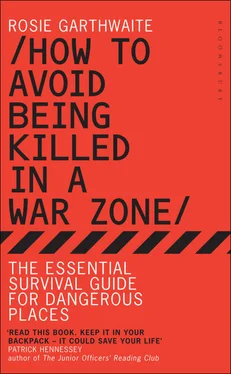Chris Cobb-Smith
I first met Chris Cobb-Smith in a favourite London pub with the mad but fantastic BBC reporter John Sweeney. We were investigating the deaths of six British ‘Red Caps’ (military policemen) during a riot in southern Iraq. I was ex-army and so was Chris, an artilleryman from the 29 Commando regiment. After working in Kosovo as a weapons inspector, he founded Chiron Resources, which provides specialist security support to news and documentary teams reporting from war zones. We have been bumping into each other on various jobs ever since. Name a conflict or disaster and you will find Chris was a visitor.
He says that in addition to having a safe house, a ‘safe room’ should be prepared in advance – somewhere to go when evacuation is impossible:
‘Offices, bureaux and accommodation in high-risk areas should have a safe room – a secured area that could be used as a last resort for sanctuary in the event of an attack or attempted abduction. The aim of a safe room is to provide a hardened sanctuary that will at least buy additional time until help arrives, and may even act as a deterrent to an aggressor.
‘Ideally, the safe room should not have any outside walls, be of substantial construction and have a solid and securable door. If the room does have windows, external or internal, they should be armoured. The room should also have power and, ideally, be equipped with a panic button connected to the agency responsible for responding to an emergency. A safe room can be specially constructed, or created by enhancing a bathroom or possibly the space under the stairs.
‘It is essential that there is a reliable quick-response force capable of responding to any emergency calls for assistance. Whoever that security agency is – police, army or private contractor – it should conduct a thorough survey of the facility and be shown the exact location of the safe room so their procedures can be comprehensively planned.’
Chris says the room must contain the following:
• At least two methods of communication – a telephone of some sort (landline, mobile or satellite) and walkie-talkies or two-way VHS radio if possible. Note that satellite phones and some radios will not work inside, so antennas will need to be ‘remoted’ to the outside to maintain a strong signal.
• A good supply of water.
• Non-perishable food (tins, dried fruit, etc.).
• Medical pack.
• Radio – for news, information and entertainment.
• Sleeping bags and blankets.
• Fire-fighting equipment.
• Personal protective equipment: body armour, helmets,
eye-protection and gas masks.
• Reading material.
• Torches and spare batteries.
• Bucket and tissues in case you are there longer than expected, or someone gets caught short.
Never go in blind. Don’t move until you know everything about where you are going.
Leith Mushtaq
Getting to know your destination starts with understanding the culture, but then you have to learn the laws of the country. And finally, there’s international law.
You probably break laws every day where you are right now. I do. I have stuffed my pockets full of bacon on flights back to Doha on more than one occasion. I drive far too fast, and badly. And I drink when I shouldn’t. Not proud, not clever.
These are rules I reckon I can get away with most of the time in a place where the rules are relatively stable. In a less forgiving place – one where the rules are changing all the time, or where there are none at all – breaking those rules could get you chucked in jail for some time, or even executed.
If there are any rules at all in a war zone, they are often made up on the spot. Wherever you are going, one of the most important things you need to do in preparation for arrival is to get a basic grasp of any awkward laws. Something as simple as failing to carry your correct ID card around can be an excuse for authorities to slam you in jail just to keep you ‘out of trouble’ for a while.
Tom Hudson has done many an extra hour’s stag (watch) for me while I slept my watch out in the frozen woods during army training. We were in the same troop at Sandhurst, and he shared his sleeping bag with me when mine was wet. He used to work as a lawyer for Linklaters, and is now the legal counsel for a Middle East security company that provides services in Iraq, Afghanistan and other ‘hostile’ environments. He offers the following expert advice.
/HOW TO AVOID BREAKING THE LAW IN A WAR ZONE
War zones, by definition, can seem entirely lawless, so describing the legal position might seem hypothetical at best. However, there is a complex matrix of laws that might apply to any war zone. Understanding these is a surprisingly difficult but key step.
The ‘law of war’ is considered a part of public international law. It’s a broad body of law concerning everything from acceptable justifications to engage in war ( jus ad bellum ) to the limits of acceptable wartime conduct ( jus in bello ). Humanitarian law plays its part. And, as ‘modern’ warfare evolves, the convergence and overlap with criminal law and civil law becomes more apparent.
Given the varied nature of people’s roles, territories and actions, the information here will not be a comprehensive guide as to what one can and can’t do. But it should get you asking the right sort of questions and give some pointers as to what law might apply to you.
Military personnel
If you are in the military, you will be well aware of military law. Taking the position of British soldiers as an example, the Military Criminal Justice System is seen as an essential part of the British Army, both at home and abroad. The Adjutant General has said that ‘it often serves where there is no law or where UK standards of law and justice are not applied. Self-regulation is therefore a prerequisite for military operations.’
The overview provided by the Armed Forces Bill Team serves as a useful summary of the legal position for the British military in war zones: ‘UK courts cannot generally try offences which are committed outside the UK. The Service system of law ensures that, as far as possible, Service personnel are dealt with by a familiar system if they commit an offence when serving overseas. They can expect a consistent and fair hearing wherever they find themselves. Without such a system, they would be dealt with under the law of the country in which they are serving or escape justice altogether. At a practical level this means that they are dealt with in a language they understand. They are also dealt with fairly by a system judged to be fully compliant with the European Convention on Human Rights (ECHR).’
A soldier will have to be cognisant of his position under military law in addition to his position under civilian law.
In September 2009, Steven Green, accused of raping and murdering an Iraqi girl, became the first former soldier to be prosecuted in the United States for crimes committed overseas. Had he been sentenced to execution, he would have been the first American soldier ever tried for war crimes in a civilian court to receive that sentence, but he was given life imprisonment instead.
Government contractors
Aside from the military, much public attention has focused on armed private security contractors. The legal treatment of the Blackwater contractors who were accused of killing 17 Iraqis in Baghdad’s Nisour Square in September 2007 caused an international media storm.
According to a December 2009 report to Congress, the US Department of Defense (DoD) workforce in Iraq and Afghanistan comprises roughly comparable numbers of contractors (218,000) and uniformed personnel (195,000). But it is estimated that less than 10 per cent are security contractors, and the rest are doing just ordinary jobs, working as electricians, engineers, canteen staff and suchlike.
Читать дальше




![Джонатан Димблби - Barbarossa - How Hitler Lost the War [calibre]](/books/385421/dzhonatan-dimblbi-barbarossa-how-hitler-lost-the-w-thumb.webp)







